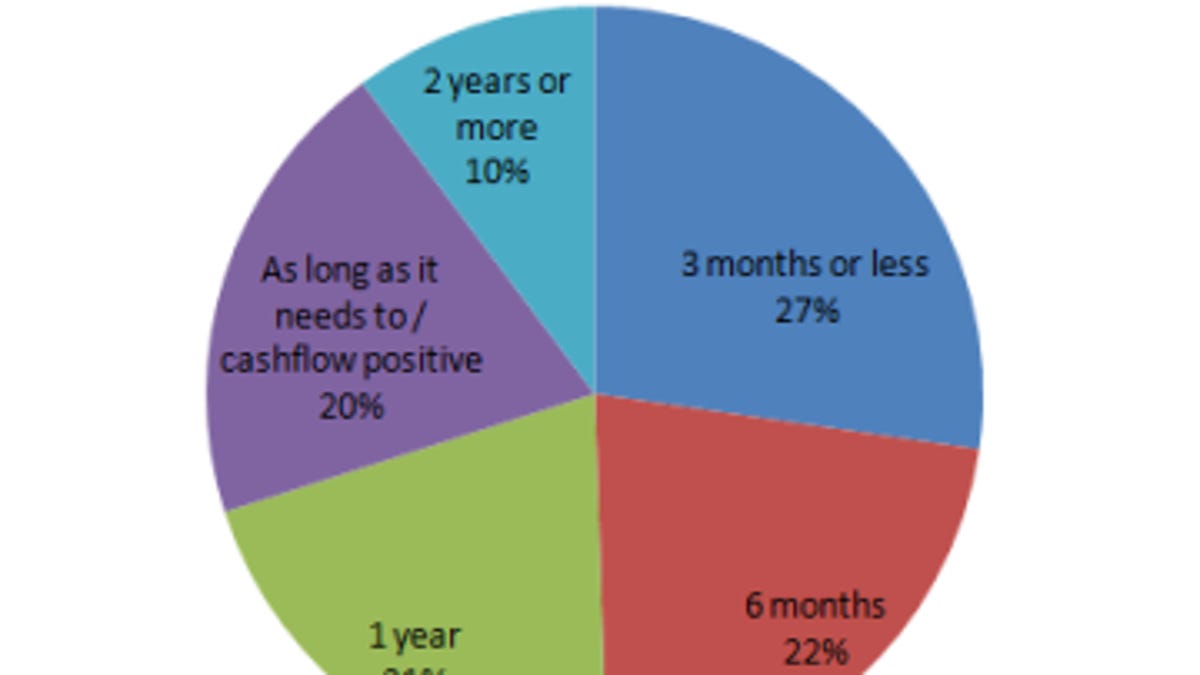Entrepreneurs are worried, but some are not worried enough
A quick survey reveals overconfidence among CEOs at start-ups. A little more fear might help more young companies survive the tanking economy.

On the one hand, I agree with Dave McClure and his bombastic post, Fear is the Mind Killer. He's right. Start-ups are by nature risky. Even in good times, when venture capitalists are spreading money on entrepreneurs like farmers spread manure, they expect only a few roses to bloom. The rest of you? Weeds. You're going to get lopped off--by competitors, your investors, or your own incompetence. That's part of the fun.
But a healthy amount of fear is a good motivator, and I have to part with McClure on one thing: there are some entrepreneurs out there who aren't afraid enough. And I have numbers.
In a quick and admittedly unscientific poll on Webware, I asked entrepreneurs to answer two questions. The practical question: "How long will your cash last?" The state of mind question: "How freaked out are you?"
If we accept that the economic downturn we're in now is going to last a year or more, then the numbers don't add up in all the start-ups' favor. Only 30 percent of 491 respondents (as of noon on October 11) said that they have two or more years of money in the bank or are cash-flow positive; 49 percent checked off either the six months or the three months-or-less box. That's a problem.
And here's the kicker: Only 33 percent of the 524 respondents to the state of mind question indicated they are "worrying about revenue and payroll." Thirty percent are "looking forward to grabbing share while other companies falter." That's my kind of entrepreneur, provided they have the powder to fight that war. According to this poll, most of them don't.
It's the group that has six months of money or less and that isn't freaking out that is in real trouble. We are heading in to a stalled economy. It will take time to get the engines turned back on and running again. Companies can survive, of course. People will still be buying food and gas and sending their kids to school and investing in their homes. They'll still work and play.
But CEOs who didn't prepare for this downturn, and who have only six months of financial runway ahead of them, should be worried. Or maybe not worried; that's just an emotion. But at least working on a different operational tactic than they have been, and certainly not "confident they are on the right track," as 33 percent of the respondents said they were. There is a degree of uncertainty about when and how the downturn will hit Web companies, though. One CEO I talked with is preparing for the worst. As he said to me last week, when we were talking about his revenue projections and his customers' outlooks, "The fact that we haven't heard a lot of bad news yet doesn't give me comfort."
Some start-ups, like Seesmic, are announcing cuts now, and we'll be hearing a lot more stories like that in coming weeks. A little later on, hopefully, we'll also start to hear the stories from companies that have changed their businesses to do the real work of servicing the needs of their customers that are working through this new reality, and that are doing more than just hunkering down for the long winter. They are always opportunities, and there is always room for aggressive business. But a little more fear might help more start-ups survive.

